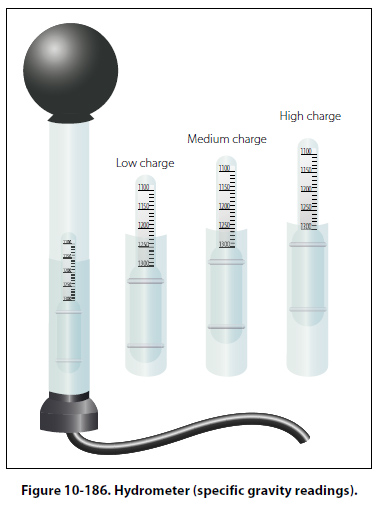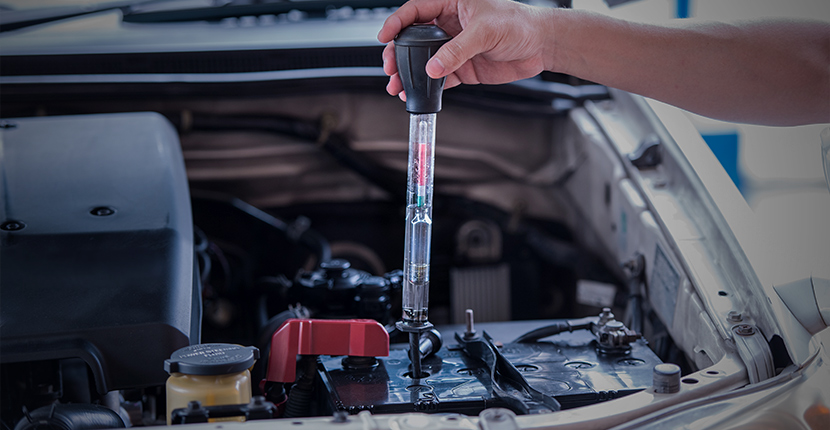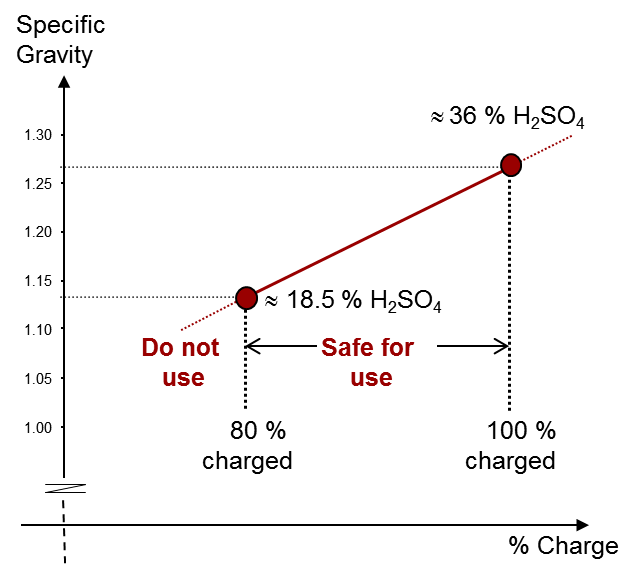Low battery specific gravity signals trouble. It might mean your battery is underperforming or failing.
Understanding this can help maintain your battery’s health and efficiency. Batteries are vital for powering vehicles and devices. When specific gravity dips, it reflects the charge state and electrolyte condition. This could lead to reduced power or even failure. Knowing how to handle this situation is crucial.
The specific gravity measures the electrolyte’s density in relation to water. A low reading can indicate a discharged battery or a need for maintenance. Addressing the issue promptly can extend your battery’s life and prevent inconvenience. In this blog, explore practical steps to diagnose and solve low specific gravity issues. Protect your battery’s lifespan and ensure reliable performance.
Identifying Low Specific Gravity
Low battery specific gravity indicates a weak charge. Check electrolyte levels and add distilled water if needed. Fully recharge the battery and test again to ensure optimal performance.
Identifying low specific gravity in a battery is crucial for maintaining its health and performance. Knowing when your battery’s specific gravity is low can prevent unexpected failures. But how do you spot the signs and what tools can help you measure it accurately? Let’s dive into this essential aspect of battery maintenance.Symptoms Of Low Gravity
You might notice your battery isn’t performing as it used to. Maybe your car takes longer to start, or your devices don’t last as long on a single charge. These are telltale signs that something might be amiss. Another symptom could be the battery’s inability to hold a charge, even after being charged for hours. Have you ever had to jump-start your car on a chilly morning? That could be your battery telling you its specific gravity is low. It’s like the battery is whispering, “I need help!”Tools For Measurement
Checking specific gravity isn’t as daunting as it sounds. You can use a tool called a hydrometer, which is a handy instrument for this task. It measures the density of the electrolyte solution in your battery. Make sure the hydrometer is clean and calibrated for accurate readings. Digital testers are also available and offer a more modern approach. They’re user-friendly and provide precise readings, making it easy for you to keep tabs on your battery’s health. Have you ever used a hydrometer before? If not, it might be time to add one to your toolbox. It’s a small investment that can save you a lot of hassle down the road. Taking these steps can help you identify low specific gravity and take action before it’s too late. By keeping an eye on these symptoms and using the right tools, you can ensure your battery stays in top shape.
Credit: avstop.com
Causes Of Low Specific Gravity
Understanding the causes of low specific gravity in your battery is crucial for maintaining its health and performance. Specific gravity, which measures the density of the battery’s electrolyte compared to water, can drop due to several factors. Addressing these issues can prolong the life of your battery and ensure it functions efficiently.
Electrolyte Imbalance
One common cause of low specific gravity is electrolyte imbalance. This can occur if the battery’s fluid levels drop or if the electrolyte becomes diluted. Imagine your battery as a recipe; if you add too much water and not enough acid, the mixture loses its potency. You might notice reduced battery performance or struggle to start your vehicle.
To fix this, check the electrolyte levels regularly. Ensure they are within the recommended range. If you find them low, consider adding distilled water to balance the levels. Avoid using tap water as it can introduce impurities. Have you ever wondered how a simple oversight can cause such a significant impact?
Temperature Effects
Temperature plays a vital role in battery performance. Cold temperatures can cause the electrolyte to contract, resulting in lower specific gravity. Conversely, high temperatures can make the electrolyte expand, altering its density. Picture your battery enduring a harsh winter or a scorching summer; both can lead to issues.
To manage temperature effects, store your battery in a climate-controlled environment if possible. Regularly check your battery’s performance during extreme weather conditions. Have you ever found yourself stranded because of battery trouble during a cold snap? Maintaining optimal temperature can prevent such scenarios.
Understanding and addressing these causes can help you maintain your battery’s health. By taking proactive steps, you ensure that your battery remains reliable and efficient. Keep an eye on these factors, and you’ll prevent most issues before they arise. What steps will you take to safeguard your battery?
Immediate Actions To Take
Facing low battery specific gravity can be concerning. Quick actions can help prevent further issues and extend battery life. Addressing the situation promptly ensures the battery remains functional and reliable. Let’s explore immediate steps to take when specific gravity is low.
Safety Precautions
Safety is crucial when handling batteries. Wear protective gloves and goggles to prevent chemical burns or eye injuries. Work in a well-ventilated area to avoid inhaling harmful fumes. Always disconnect the battery from any power source before inspecting or troubleshooting.
Simple Troubleshooting Steps
First, check the battery terminals for corrosion. Clean them using a mixture of baking soda and water. Ensure all connections are tight and secure. Next, check the electrolyte level. If it’s low, add distilled water to the battery cells. Avoid overfilling as it can cause overflow during charging.
Measure the specific gravity with a hydrometer. Compare readings across all cells. If one cell shows significantly lower gravity, it might be faulty. Charging the battery may improve specific gravity. Use a low amp charger to avoid overheating and further damage.
Recharging The Battery
Recharging a battery with low specific gravity is essential. Proper care ensures the battery regains its full capacity. Understanding the correct process is crucial. This guarantees safety and effectiveness. Let’s explore how to recharge your battery properly.
Choosing The Right Charger
Selecting the right charger is important. Not all chargers suit every battery type. Check your battery’s specifications first. Use a charger compatible with these specifications. This prevents damage and extends battery life.
Always consider the charger’s output. It should match the battery’s requirements. Overcharging risks damaging the battery. Undercharging doesn’t fully restore capacity. A smart charger can be a good choice. It adjusts charging based on the battery’s condition.
Safe Charging Practices
Safety is paramount during charging. Always charge in a well-ventilated area. This reduces the risk of harmful gas buildup. Keep the charger and battery away from flammable materials. Ensure the charger is off before connecting it to the battery.
Check connections for tightness. Loose connections can cause sparks or overheating. Regularly monitor the charging process. This helps prevent potential issues. Once charged, disconnect the charger. Store the battery in a safe place.
Maintaining Optimal Levels
Maintaining optimal levels of battery specific gravity is essential. It ensures your battery performs efficiently and lasts longer. Specific gravity indicates the battery’s charge state. Low levels can mean poor performance or damage. Regular checks and maintenance can prevent this. A few simple actions can keep your battery healthy.
Regular Maintenance Tips
Check your battery’s fluid levels regularly. Use distilled water if needed. Ensure the battery terminals are clean. Corrosion can lead to poor connections. Clean terminals with a mixture of baking soda and water. Rinse thoroughly. Always handle batteries with care. Wear protective gear during maintenance.
Avoiding Common Mistakes
Avoid overcharging your battery. Overcharging can decrease its lifespan. Ensure your charger is set correctly. Don’t ignore warning signs. Low performance or slow starts may indicate issues. Address them promptly. Avoid using tap water for battery maintenance. It contains minerals that can harm the battery.
When To Seek Professional Help
Experiencing low battery specific gravity indicates potential problems. Seek expert advice if readings remain low after charging. Persistent issues might suggest battery damage or malfunction, requiring professional help to ensure safety and proper functioning.
When faced with low battery specific gravity, acting quickly is crucial. Some situations may need professional help to ensure safety and efficiency. Understanding when to call in a professional can save time and prevent further issues.Signs Of Severe Issues
Certain symptoms indicate severe battery problems. A battery that won’t hold a charge is a major sign. Also, a battery with excessive corrosion around terminals needs attention. Slow engine starts or dim lights are alarming too. If you notice any of these, consider seeking expert advice.Finding A Reliable Technician
Locating a trustworthy technician is essential. Start by asking friends or family for recommendations. Read online reviews to gauge customer satisfaction. Certifications and experience levels are important factors too. Choose someone with a solid reputation in battery maintenance. A reliable technician ensures your battery’s long-term health.Preventive Measures
Maintaining a healthy battery is crucial for optimal performance. Low specific gravity in a battery can lead to reduced efficiency and lifespan. Implementing preventive measures can help avoid these issues.
Routine Inspections
Check your battery’s specific gravity regularly. Monthly checks help detect issues early. Use a hydrometer to measure the acid’s density. Look for signs of wear or damage. Clean battery terminals to prevent corrosion. Ensure cables are tightly connected. A secure connection improves performance.
Proper Storage Techniques
Store batteries in a cool, dry place. Avoid extreme temperatures. Heat can cause evaporation and reduce efficiency. Cold can slow chemical reactions. Keep batteries upright to prevent acid leakage. Ensure they are fully charged before storage. A charged battery maintains its health better.

Credit: www.large.net
Alternative Solutions
Low battery specific gravity indicates a potential issue with the battery’s electrolyte. Consider checking for sulfation or topping up the electrolyte with distilled water. Regular maintenance and proper charging can often resolve these issues, ensuring your battery operates efficiently.
When you find yourself dealing with low battery specific gravity, it can feel like you’re stuck at a crossroads. You might wonder about the best course of action to restore your battery’s health. While traditional methods like recharging and maintenance are vital, sometimes you need to explore alternative solutions. These solutions can save time and improve battery performance, giving you peace of mind.Using Additives
Sometimes, a simple fix like adding an electrolyte additive can make a significant difference. These additives are designed to enhance battery performance by improving its chemical balance. I remember using an additive for my car battery, which extended its life by several months. The process was straightforward: I added the recommended amount directly into the battery cells, ensuring I followed the instructions carefully. Always check the compatibility of the additive with your battery type. Some additives might work wonders for lead-acid batteries but could be detrimental to others. Have you ever tried using additives in your battery maintenance routine?Considering Battery Replacement
There comes a time when holding onto a failing battery might cost you more in frustration than replacing it. If the specific gravity remains stubbornly low despite your best efforts, it might be time to consider a replacement. Think about how much your peace of mind is worth. Replacing a battery might seem like a hefty investment upfront, but it could save you from unexpected breakdowns and costly repairs. I once faced a similar decision with my old laptop battery. After multiple attempts to revive it, I opted for a replacement, resulting in smoother performance and longer usage hours. Have you weighed the pros and cons of replacement versus continued maintenance? Engaging with these alternative solutions can help you make informed decisions about your battery’s future. Whether through additives or replacement, taking action can pave the way for better reliability and performance. What’s your preferred approach when dealing with battery issues?
Credit: www.batteriesplus.com
Frequently Asked Questions
What To Do If Battery Gravity Is Low?
Check electrolyte levels and refill with distilled water if needed. Recharge the battery slowly. Clean terminals and ensure connections are tight. Test battery performance with a hydrometer. If issues persist, consult a professional or consider replacing the battery.
How To Increase The Specific Gravity Of A Battery?
To increase a battery’s specific gravity, add electrolyte with higher acid concentration. Check levels regularly and top off with distilled water. Ensure proper charging and maintenance to stabilize gravity. Avoid overcharging to prevent damage.
What To Do If Battery Capacity Is Low?
Check for battery replacement options. Optimize device settings to conserve energy. Use battery-saving apps. Charge fully before use. Avoid extreme temperatures.
What Happens If Battery Acid Is Low?
Low battery acid can reduce performance, cause charging issues, or damage the battery. Check and refill with distilled water.
Conclusion
Keeping battery specific gravity optimal is crucial for performance. Low gravity signals issues. Regular checks and maintenance can prevent problems. Clean terminals and ensure proper charging. Monitor electrolyte levels carefully. If low specific gravity persists, consult a professional. They can diagnose and fix underlying problems.
Regular maintenance extends battery life. It ensures reliability and efficiency. Follow these tips to avoid costly replacements. A healthy battery means a reliable vehicle. Stay proactive and informed. Your battery will thank you. Always prioritize safety and functionality.
